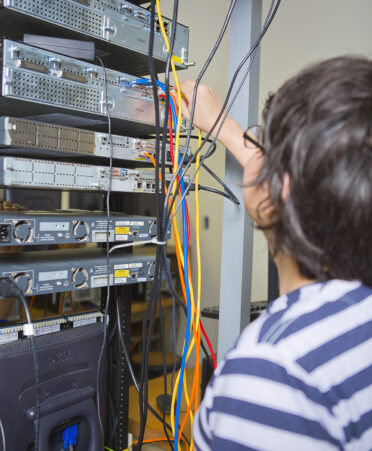(ABILENE, Texas) – A new wave of computer technicians is learning to keep the world connected at Texas State Technical College.
Adrian Medrano, a Computer Networking and Systems Administration instructor, said the program’s goal is to produce a graduate who is knowledgeable in all areas of information technology.
“We do not focus on one area, and that is due to the fact that most information technology shops need a versatile tech,” he said. “The days of techs focusing on one specific job have slowly been fading away. Employers are looking for techs that can think quickly on their feet, problem-solve and interact with the public. A tech that can diagnose a problem, interact properly with a user or customer and fix the problem, all within a timely manner, is worth their weight in gold.”
Medrano discussed the program’s benefits and the job outlook for its graduates.
What benefits do students have by working online, and how will that help them in the workforce?
Working online has always been beneficial to our program. Remote work in information technology has provided workers access to essential programs and devices for a long time. Since COVID, we have seen an increase of remote workers in the industry, which I believe has led to employers seeing firsthand how effective remote workers can be.
Do students need to have any basic computer experience to start the program?
It has been my experience that (new) students with zero computer skills have been just as successful as students with computer skills. In fact, those without computer skills have been more successful due to their drive to be better than those with some computer skills.
How has TSTC kept up with the constant updating of computers in the workplace?
We have found that TSTC has surpassed what the industry is using in regards to equipment and software, the difference being that large companies tend to have a higher budget for upgraded equipment. TSTC is definitely at the forefront of having up-to-date equipment, which allows us to train students on equipment that some industry partners are using, and to prepare students who may be working for companies that may have dated equipment and software.
What areas in the workforce have the most need for technicians?
I see job applications for companies in the medical field all the time. We have industry partners scattered throughout the job workforce requiring entry-level and some advanced-level techs.
What can students expect to learn?
Students should be prepared to learn information technology-related tasks, for example, fixing broken computers, resetting passwords, connecting to printers and scanners, setting up profiles for users on a network, working the help desk, and (having an) understanding of TCP/IP (transmission control protocol/internet protocol) and network addressing. Students may also be tasked with working with server equipment, configuring routers and switches on the network, and assisting network administrators and managers on upgrades and migration of data and users.
What have graduates told you about their experiences in the field and how TSTC prepared them for success?
I have students that always comment on how much they have learned while being at TSTC and how much they retained in such a short period of time. They remember lectures and labs that have helped them while working in the field. They tell me, “I am glad I paid attention when you showed us how to configure a router and switch or when you showed us how to wire a network properly.”
For more information about TSTC, visit tstc.edu.
